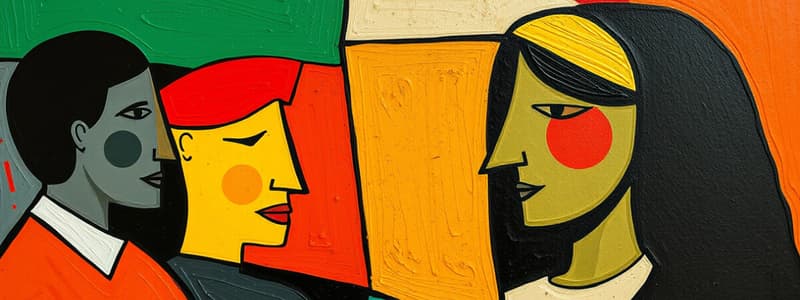Podcast
Questions and Answers
How is class experience defined?
How is class experience defined?
economic class, political class, cultural class
What is meant by the term 'economic class'?
What is meant by the term 'economic class'?
income and accumulated wealth
What is meant by the term 'political class'?
What is meant by the term 'political class'?
power to influence the public and political process
What is meant by the term 'cultural class'?
What is meant by the term 'cultural class'?
What is cultural capital?
What is cultural capital?
What is meant by the term 'post-industrial society'?
What is meant by the term 'post-industrial society'?
What is a white-collar worker?
What is a white-collar worker?
What is a blue-collar worker?
What is a blue-collar worker?
What is a pink-collar worker?
What is a pink-collar worker?
What is the conservative understanding of 'class warfare'?
What is the conservative understanding of 'class warfare'?
How does Barbara Ehrenreich define 'class warfare'?
How does Barbara Ehrenreich define 'class warfare'?
What is class consciousness?
What is class consciousness?
What are the 'rules' of inclusion for African Americans on primetime TV in the 1970s?
What are the 'rules' of inclusion for African Americans on primetime TV in the 1970s?
What is The American Dream?
What is The American Dream?
What is the 'double shift' for women workers?
What is the 'double shift' for women workers?
How are women's working-class problems generally framed?
How are women's working-class problems generally framed?
What does the Roseanne feminist show portray?
What does the Roseanne feminist show portray?
How is the worker on television usually represented?
How is the worker on television usually represented?
What ideological commonsense does the 'class clown' idea reproduce?
What ideological commonsense does the 'class clown' idea reproduce?
What are the 5 'inferior qualities' of the 'class clown' stereotype?
What are the 5 'inferior qualities' of the 'class clown' stereotype?
What is 'bad taste' in the context of the working class?
What is 'bad taste' in the context of the working class?
What does 'lack of intelligence' imply about the working class?
What does 'lack of intelligence' imply about the working class?
What are 'reactionary politics' in the working class context?
What are 'reactionary politics' in the working class context?
How is 'poor work ethic' portrayed in the media?
How is 'poor work ethic' portrayed in the media?
What does 'dysfunctional family values' mean?
What does 'dysfunctional family values' mean?
How are poor blacks and poor whites pictured on TV differently?
How are poor blacks and poor whites pictured on TV differently?
What is the portrayal of white trash in media?
What is the portrayal of white trash in media?
What does redneck as a 'lifestyle choice' imply?
What does redneck as a 'lifestyle choice' imply?
Why are labor union actions scarce in media?
Why are labor union actions scarce in media?
Flashcards are hidden until you start studying
Study Notes
Class Experience
- Defined by three interconnected dimensions: economic class, political class, and cultural class.
Economic Class
- Relates to income and accumulated wealth, serving as a primary measure of one’s financial status.
Political Class
- Involves the power to influence political processes and public opinion, affecting governance and policy decisions.
Cultural Class
- Encompasses education, taste, and lifestyle, collectively referred to as cultural capital.
Cultural Capital
- Represents knowledge, habits, and tastes learned from family, facilitating access to valuable societal resources.
Post-Industrial Society
- Not explicitly defined; further clarification needed from Tompkins.
White-Collar Worker
- Professionals working in office settings, typically full-time and salaried, often associated with administrative roles.
Blue-Collar Worker
- Individuals engaged in manual labor, often earning hourly wages in manufacturing or skilled trades.
Pink-Collar Worker
- Workers in female-dominated professions generally facing lower pay.
Conservative View on "Class Warfare"
- Conservatives argue that "class warfare" is a harmful liberal ideology, attributing societal problems to income inequality and blaming liberal policies for economic decline and loss of American status.
Barbara Ehrenreich on "Class Warfare"
- Suggests class is a muddled concept in America, with societal focus placed on a default middle class lacking in active class consciousness.
Class Consciousness
- Refers to the awareness of one’s economic group and the perceived opposition to different economic interests.
Representation of African Americans in the 1970s TV
- Minorities needed to embody the American dream to gain screen time, showcasing success without discussing systemic issues or advocating for wealth redistribution.
The American Dream
- The belief that individual effort and hard work lead to success, regardless of race, gender, or class background.
Double Shift for Women Workers
- Women often face wage disparities and manage paid work alongside unpaid domestic responsibilities, especially affecting single mothers.
Framing of Women's Working-Class Issues
- Challenges are typically portrayed as personal failures rather than structural class problems.
Roseanne and Feminism
- The show highlighted feminist issues and the struggles of working-class women, emphasizing the need for childcare and labor division in families.
TV Representation of Workers as "Clowns"
- Working-class characters are often depicted inadequately, perpetuating stereotypes of personal failings rather than acknowledging social restrictions.
Ideological "Commonsense" of "Class Clown"
- Reinforces myths of upward mobility in America, suggesting personal shortcomings are to blame for social status.
"Class Clown" Stereotype Traits
- Defined by bad taste, lack of intelligence, reactionary politics, poor work ethic, and dysfunctional family values.
Bad Taste
- Working-class lifestyles are portrayed stereotypically, as individuals are seen as undeserving of better circumstances.
Lack of Intelligence
- Characters are depicted as unintelligent and anti-intellectual, overshadowing their historical role in advocating for education.
Reactionary Politics
- Working-class individuals shown as disinterested or close-minded in political views, negating their historical political activism.
Poor Work Ethic
- Stereotyped as lazy and incompetent workers, overshadowed by rising productivity rates and corporate profits.
Dysfunctional Family Values
- Representations transition from idealized nuclear families to depictions of parenting failures and societal issues, ignoring systemic problems.
Differences in Representations of Poor Blacks and Whites
- Poor whites are often portrayed as innocuous, while poor blacks are depicted as criminals, driven by societal failings.
White Trash as Cultural Outcasts
- Represents a limited understanding of poor whites, often mocked or relegated to comedic roles in media narratives.
Redneck as "Lifestyle Choice"
- Political co-opting of "redneck pride" contrasts with negative portrayals of poor whites, reinforcing stereotypes of deviance and lack of discipline.
Scarcity of Labor Union Representation
- Labor union actions are underrepresented in media, contributing to a skewed understanding of the working-class experience amidst corporate-controlled narratives.
Studying That Suits You
Use AI to generate personalized quizzes and flashcards to suit your learning preferences.




